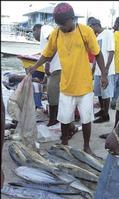Earl Moxam, Senior Gleaner Writer
A young fisherman examines some of the catches after the 21st annual Canoe Tournament in Port Antonio last October. - File
YEARS OF losing their fish pots and fish to 'pirates' have left south coast fishermen in particular, fuming and vowing to strike back at the criminals.
"If it's war they want then we have to bring war to them. We are the legitimate owners of those traps and we're not going to stand by and allow anybody to go out there and pull them in our presence. It's not going to work!" That's the warning from Havelan Honeyghan, president of the Jamaica Fishermen's Co-operative Union.
Fish pot piracy the theft of the traditional wire mesh fish traps or stealing the fish from the pots - is a decades-old problem for legitimate fishermen. According to Honey-ghan and many other fishermen, however, it has never been this bad. So bad, according to Whitehouse-based Honeyghan, that on a recent trip, he returned with only $800 worth of fish, instead of the $15,000 he was expecting. That is after spending thousands of dollars to prepare for the fishing expedition.
At known locations along the south coast, the veteran sea captain alleges, as many as four boats regularly set out to sea, expecting to return with a rich catch. The only problem, he says, is that they do not have any fish pot from which to retrieve this catch. Whether it is on the Pedro Banks or at "near sea", a few miles out from shore, the lament is the same - pots stolen, or opened by the 'pirates', their precious catch of fish and lobsters removed by these predators.
POOR ENVIRONMENTAL
PRACTICES
It is a problem readily acknowledged by Andre Kong, director of fisheries. Speaking recently on "Breakthrough" a Power 106 programme - he said that the fishermen's problems were compounded by poor environmental practices and over-fishing. As a result, he said, the fish traps were now catching much less than they traditionally did, with each pot producing as little as three pounds of fish.
"When fishermen have spent a lot of money and put out to sea and they pull all these traps and don't catch much, they are in dire straits and sometimes the temptation is to draw somebody else's trap. It's a complicated problem", Kong admitted.
Nevertheless, he said that the fisheries division and other stakeholders in the industry were pursuing a number of possible solutions. In addition to enforcing the current regulations, which require the licensing and registration of fishermen and their boats, he said the division was now seeking to set up a radio communication system, to include all legitimate fishermen. USAID, he disclosed, has promised to assist with funding for the project.
"If we have the radio communication system, once the fishermen get sight of any illicit activity they can inform the Coast Guard and Marine Police and we can try to intercept", Kong reasoned.
The need to have a radio communication system has become even more urgent, according to Havelan Honeyghan, what with the introduction of high-powered weapons into the piracy 'business'. The renegades, he reports, now enter pot sets where the legitimate fishermen are retrieving their catch and brazenly rob them of their property before driving them away.
Similarly, Kong revealed, those who travel to the Pedro Cays to purchase fish for cash from the fishermen based on the cays, are sometimes ambushed by thieves and their fish and cash taken away.
NO EASY TASK
Policing Jamaica's maritime space of 274,000 sq km (approximately 25 times the size of the mainland) is no easy task for the authorities.
Against this background, Inspector Oral Harrison of the divisional headquarters of the marine police in Kingston is advising legitimate fishermen to cooperage fully with the security forces in order to bring the situation under control.
"Policing at sea can be very difficult in light of the fact that to identify items that are stolen like fish pots is not an easy task. It also poses a problem for the police in going out there because the culprits will identify the police launches from a distance and make good their escape", he said.
One possible effective strategy, he said, was for fishermen to go out in properly identified groups, which would enable them to identify those who are not with the group and are not registered and licensed.
"Boats are marked and they have their beaches and numbers that are assigned to them painted on the boats. So if these boats are in an area that they should not be then the authorities could be alerted".
Like all other divisions in the constabulary, Inspector Harrison admits that the marine police are constrained by resource limitations. He is seeking to assure the fishermen, however, that there have recently been improvements in the manpower and equipment available to the division, "which enable us to patrol our shoreline".
Havelan Honeyghan wants the police to start by visiting those beaches already identified as sources of the problem. Beaches, he alleges, from which it is known that non-fishermen regularly set out in groups of as many as four boats for destinations where they have no fish pots, yet they return with a rich bounty on each occasion.
"I am calling on the authorities to interrogate them when they return with their catches. When they say they are going line fishing and return with doctor fish and goat fish (which are not traditional line fish) then questions must be asked," he fumed.
Marine Police
deployments
Kingston divisional
headquarters: 40
Port Antonio: 9
Ocho Rios: 7
Montego Bay: 7
Negril: 5
New posts to be established at: Bowden, St. Thomas, Black River, St. Elizabeth (where the Jamaica Defence Force Coast Guard already has a base).



























